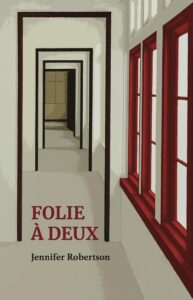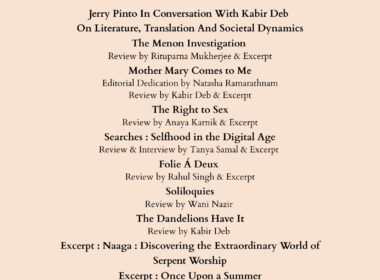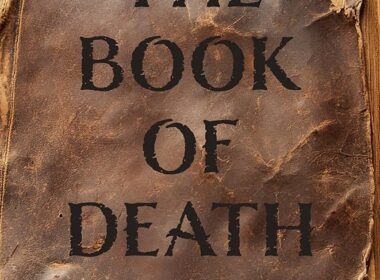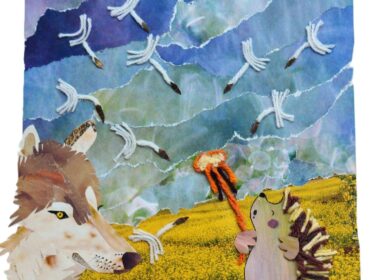Review Folie Á Deux
By Rahul Singh

Image ourtesy of Paperwall Publishing
The hallmark of an excellent poem is that you want to read it again and again. And if a bunch of such poems are brought together, no matter how thematically coherent or consistent the arrangement, reading the collection from cover to cover becomes an onerous task. Every poem forces you to stay with it. It takes effort to abandon a poem to move on to the next one. This I guess should be the hallmark of an excellent collection of poems. Folie A Deux, which is the first collection of Jennifer Robertson’s poems, distinctly carries this hallmark.
The purpose of a review is to let a reader know in advance what she is getting into. To get a sense of what the texture of the reading experience is going to be. In this spirit, it is perfectly reasonable to ask before picking up this book what kind of a poet Jennifer Robertson is. Fortunately for us, she herself drops a hint in a poem called ‘Bleu’. It is not uncharacteristic of poets to drop such hints in their work about what they are trying to do. At times these hints sound like pompous proclamations but sometimes they take the form of a beautiful image that sticks. An image so vivid and precise that fellow writers wish to have come up with it to define their writing. Here is Jennifer’s hint —
Somewhere in the distance,
a leaf falls
and displaces its shadow.
I have been looking for that shadow
and writing of that fall.
If it were a pronouncement (I’m sure it is not) no one would have held it against the poet. Almost every poem in this collection is the evidence of this search — this looking for that shadow consumed by the very thing that gave birth to it. Unsurprisingly, the collection is dedicated to her parents.
Theme
There’s a myriad of themes explored in the collection. It’s hard enough to ascribe a specific theme to an individual poem. To try and do it for a collection is futile. But I couldn’t help but notice an unmistakable undercurrent of violence running through some of the poems. At times it is evoked through a terse remark —
I could talk about the woman
who had facial scrapes, bruises and cuts.
All minor injuries.
But let’s talk about the SONY India web page instead.
At times as a subtle observation —
I like the tiny economies of restraint
of not knowing the size of your fist
when the doorbell rings.
These images also introduce a turn in each of the above poems, which brings me to what I found the most remarkable thing about the collection.
Craft
Language is a sense-making tool. The more seamlessly ‘sense’ travels through a sentence, the better the prose. In poetry, sense and sound travel together. Often, both are at odds with each other. Good poetry happens when this conflict is resolved. In a way, the practice of poetry can be defined as finding ways of resolving this conflict. There are many poems from this collection that can be held as perfect examples of this practice. Take these lines from a poem titled ‘Pots, Pans, and Metals’ for example —
Silence
and chrysanthemums rush in
The sibilant sound is so neatly arranged that the sudden jump in sense from ‘silence’ to the name of a flower is not noticed. Not in an interfering way. Silently these lines slip into the reader’s mind a metaphor she can do some mental munching on. In the same poem there is another set of lines that go like this —
I hear the free-fall when you pray.
Levity lulls your words
in songs you often slay.
Each line is a consonantal sound cluster. The first with its ‘r’ sound, the second with ‘l’, and the third with ‘s’ sliding through to the end of the line, rounding it off with an end-rhyme. Is there a thing more pleasurable in poetry than unexpected rhymes?
This is not the only place in this book where one encounters unexpected sound-play. In a poem called ‘Filming Amnesia in Monochrome’, the speaker describes the contents on panch-phoran, a spice mixture, like this —
fragrant fennel with a buzz of black mustard; a pinch of nigella; a fallowed flourish of fenugreek with a bit of cumin candour.
This is the most obvious example of deliberate arrangement of sounds. The book is full of such sound pockets that silently exist without, in any way, coming in the way of sense-making — your palms might mask a meandering intermezzo; buildings, baby bones baffling stone heads; subtly, you say, bit by bit; and so on.
It is easy for poets to keep self-indulgently playing with sounds, and even some sense, without having any insights from real life. Literature is supposed to act as a magnifying glass to observe reality from up close or see things that otherwise remain tucked in the back-room o hif our consciousness. In many of her poems, Robertson comes across as a keen observer of life. Consider this bit from one of her prose poems —
In the year 1987, I was riding pillion and my Dad was saying something; his voice was incoherent, I remember. I put my ears against his back. His voice remained muffled but the volume got amplified.
The amplification of a muffled voice is something we all must have experienced but to accidentally find it in a poem etches the image into the reader’s memory. There is another image that I have not been able to get out of my head. The more I think about it the more interesting it becomes. She writes about void —
it throbs,
like an incision
a master stylist
approaching the sublime.
Sublime is nothing but throbbing of the void. Robertson gives it a concrete form by calling it an incision. It takes an observant as well as imaginative mind to come up with this metaphor. It is at moments like these that one wonders if they are indeed two separate types of minds.
This collection is also a constellation of different interesting forms. For example, there is a poem called ‘The Relevance of Assorted Wikipedia Lines’ which is composed around a few factual statements from Wikipedia. There is another poem in this collection called ‘Everything That Lived Once Returns to Silence’ which condenses the essence of the entire poem into a single final word — alluvial. In subsequent readings, the word ‘alluvial’ feels like a magic lamp out of which the whole body of the poem emerges like a genie. There is another poem called ‘The Afterlife’ that has a similar effect.
The only thing that miffed me about this collection are the allusions, especially to movies. The poet seems to have taken for granted the reader’s familiarity not just with the films but also her interpretation of it. For example, ‘a metaphysical moment in a Weerasethakal film’ in a poem appears out of the blue and cinema noobs like me are left stranded with something they cannot imagine. A sudden shift from vivid images to the mind’s black screen sometimes feels jarring. But this is partly due to my lack of exposure to cinema and this probably renders the criticism void. But, if not in a review, where else would a reader register his complaint? I’m sure cinema-literate people would love these allusions.
For people in love with poetry, especially with the craft of it, this collection is a gift. It was refreshing to read something that drew my sustained attention to the only tool available to poets — language. Nothing more can be said about the book that can trump the actual experience of reading the poems. So, here is a sample of poems from the collection.
Bleu
You approach me with
an intimate strangeness.
A deeper shade of blue.
You are not constant.
I wonder if I am.
Somewhere in the distance,
a leaf falls
and displaces its shadow.
I have been looking for that shadow
and writing of that fall.
The Afterlife
You move from tongue
to silence with a wanton ordinariness.
I draw a blur across my
face line after line after
line.
This is how we perish
and knock on window panes
like secret,
convulsive
winds.
This is how we mend
a secondary storm: chipped
and clairvoyant.
We then call it beautiful, eternal
unable to find a
synonym or a fluted
word that
disappears
lingers stays.
The Tiny Economies of Restraint
I like not knowing your
coldness or the length of your
shadow
or the haunted architecture of your face.
I do not want to know the names of cemeteries
you’ve been to, or how the dead walk on
knives.
I like the tiny economies of restraint,
of not knowing the size of your
fist when the doorbell rings.
For I Am a Rain Dog Too
I think of poets
as hoodlums, in rolled up sleeves
and chalky-hands delivering
delinquencies as inheritance,
in containers of
time definite wounds
carefully labelled as:
fragile, benign, malignant.
And yet the writing keels over
a capsized ship,
contaminating the sea with
hazardous cargo.
Fuckin’ Poets. Always making the sea Red.
Always Your Diction, Never You
There is a
crescent-shaped void –
that
overlaps
sometimes
unwittingly.
It sleeps on red
bricks, burns
like charcoal
on sand,
raining
rapidly on my mind.
It’s a thirst that
lip-syncs, in quick
succession.
An unapproved mumble
There’s an emptiness:
suave,
incisive
torrential
It refuses to fill, refuses to
die. it throbs,
like an
incision a
master stylist
approaching the sublime.
Becoming Lydia Davis
‘What concerns me is that man, unable to articulate, to express
himself adequately, reverts to action. Since the vocabulary of
action is limited, as it were, to his body, he is bound to act
violently, extending his vocabulary with a weapon where there
should have been an adjective.’
– Joseph Brodsky
I could list down how Ibuprofen
could be a useful drug:
Non-steroidal, anti-inflammatory. I
could
talk about the man who advised
icing the bruise.
I could talk about the woman
who had facial scrapes, bruises and
cuts. All minor injuries.
But let’s talk about the SONY India web page instead,
that instructs its users to call
1800-103-7799 on all seven days, 9 a.m.
to 7:30 p.m.
So, the man called the toll free number
and reported that his 32 inch EX420
series BRAVIA LCD TV was severely
damaged and was not half as bright as it used
to be.
He was advised that he could either
take the TV apart, sell the PSU
board on OLX.in
or get a second-hand replacement
LCD panel. He decided to sell
the parts and dump the
carcass.
Now, the woman could’ve
caterwauled like a cat in heat but
the woman was smart.
She knew that
vinegar is a good
astringent.
It helps the blood to congeal
Excerpted with permission from Folie Á Deux by Jennifer Roberston published by Paperwall Publishing 2025
Jennifer Robertson is a poet, critic, and an independent consultant based in Bombay. Jennifer’s critical essays have appeared in The American Book Review, The Scroll, Telegraph, Mint, and Vayavya. Her poems have been published by the Emma Press, UK, The Missing Slate, Almost Island, and Domus. Her poems have been widely anthologised in the Global Anthology of Anglophone Poetry published by Poetry Foundation, USA; the 40 under 40: Anthology of Post-Globalisation Poetry published by Poetrywala; Modern English Poetry by Younger Indians (Sahitya Akademi); and The Penguin Book of Indian Poets. Jennifer’s poem have been translated to Chinese as a part of an Indo-Chinese translation project entitled Himalayas: Contemporary Indian & Chinese Poetry. Jennifer has convened the literary chapter for the PEN All-India Centre at Prithvi Theatre, and was the literary curator for the ‘Celebrate Bandra Festival’.Her debut poetry collection Folie à deux won The (Great) Indian Poetry Collective’s Editor’s Choice Award. The American edition of Folie à deux was published by Everybody Press in the USA.

Reviewer
Rahul writes Mehfil (a newsletter on literature, music, and other trivial matters) and Wicked Cricket (a newsletter on cricket). He works as a Data Analyst and spends most of his non-working hours reading and writing. He is from Allahabad and lives in Bangalore.





